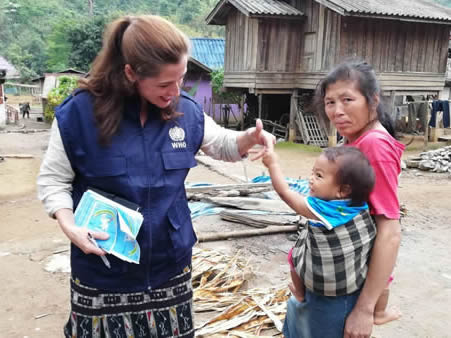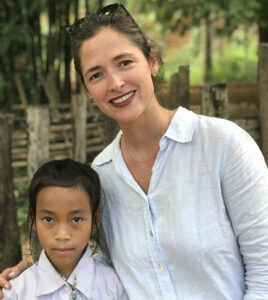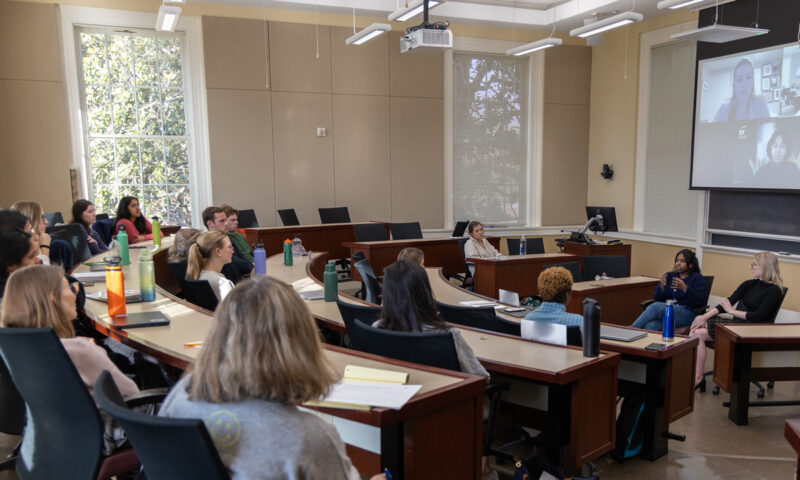In 2002, in the same year Lauren Franzel walked the Lawn, she joined the Peace Corps and took an assignment in West Africa. She says that living in a small village in Senegal for two years probably wasn’t what she envisioned for her future self when she began her time at UVA.
A year earlier, during the summer of 2001, between her third and fourth years, she was interning with Merrill Lynch and shuttling between the company’s locations in New Jersey and next to New York’s Twin Towers. In her fourth year, which followed the Sept. 11 attacks on the World Trade Center, she reevaluated her plans.
“I began looking into alternative career tracks, and my ‘Promotions’ professor, Jack Lindgren, had been in the Peace Corps in the Philippines and spoke fondly about his experience, calling it the one of the most formative of his life,” Franzel says.
Relocating to a hut in a family’s compound, she was amazed to discover how a place that came across as so particularly foreign was capable of feeling like home. Serving as a small business development volunteer, she established a rotating credit system for members to take out small loans to undertake different income-generating endeavors. She also quickly began taking on other responsibilities to assist with local needs, which included helping parents understand the importance of allowing their daughters to continue school past the primary level and promoting the end of the excision practice (sometimes referred to as female circumcision).
“By the time I finished the Peace Corps in late 2004, I knew I wanted to focus my career on health, especially that of women and children.”
Franzel moved back to the U.S., established herself in Washington, D.C., and set out to find a role where she could use her business skills to make international health programs more efficient and available to more people.
Five years later, with dual master’s degrees in public health and business from Johns Hopkins University, she and her husband welcomed their first child and decided to move overseas. Franzel found a position in Geneva, Switzerland, that relied on her unique business knowledge to improve access to life-saving vaccines.
 “I was responsible for understanding current and future vaccine market dynamics and liaising between international organizations like the World Health Organization (WHO) and UNICEF and the industry partners that are responsible to supply vaccines. It was a tremendous experience and took me all around the world, meeting pharmaceutical companies, brokering supply and price agreements, and more.”
“I was responsible for understanding current and future vaccine market dynamics and liaising between international organizations like the World Health Organization (WHO) and UNICEF and the industry partners that are responsible to supply vaccines. It was a tremendous experience and took me all around the world, meeting pharmaceutical companies, brokering supply and price agreements, and more.”
Now located in Vientiane, Lao PDR (Laos), she serves as the Team Lead with the WHO for vaccine-preventable disease and immunization. We recently spoke with her about the challenges of working in this highly important field amidst the current pandemic, sustainability, and how her time at McIntire prepared her for the role she has today.
You’ve lived in many places, but how did you wind up in Lao PDR?
After about seven years in Geneva, we were ready to take our two young sons back out into the world, and we decided to move to Lao PDR. I had been here for work prior to taking a job here. In many ways, it’s a well-kept secret. I often have to tell people “next to Thailand” or “near China” when I mention where I live. For a young family, it’s an idyllic location: very safe, not so congested (like Bangkok or Manila), and easily accessible to the rest of Asia. I’ve had several friends from UVA visit us here, and I’ve met up with other alums in the region. It is also stunningly beautiful, and the people are calm and welcoming. I feel like I hit the jackpot living here. We have also been able to complete our family while living here, with the arrival of a baby girl in 2019.
It seems that much of your work over the last decade has been, in part, leading teams and managing relationships. What have you learned about successful leadership when overseeing diverse sets of people from across the globe with different areas of expertise?
As a leader and a manager, I always try to play to people’s strengths. I believe that people want to do good work; they want to be successful and have an impact. It’s my job to give them what they need to do that. My current team has experts from Lao PDR, as well as two other Asian countries (Korea and Japan), two African countries (Ethiopia and Ghana), Australia, and Spain. It’s a tremendous, high-performing team, but it takes work. We all bring our own communication styles and approaches to engaging; these differences need to be recognized and managed so that the team can function optimally.
The other thing that I take great pride in as a manager is recognition. Too often, as the leader of team, I’m the one who receives credit or acknowledgement on behalf of the team. I never miss an opportunity to recognize the individuals who’ve made the success possible.
 As a Team Leader with the WHO, what do you enjoy most about what you do? What drives you?
As a Team Leader with the WHO, what do you enjoy most about what you do? What drives you?
I really feel tremendously privileged to do the work that I do. The work is so important and impactful; I wake up most days excited about problem solving and advancing efforts to protect the health of women and children, individuals, as well as entire communities. These programs contribute to significant reductions in infant mortality rates (IMRs), and that means fewer mothers and fathers are devastated by the loss of their baby. In Lao PDR, the IMR fell from 54 per 1,000 live births to 36 in just 10 years (2009-2019). It’s tremendous, and more gains can be made by improving access to health services and life-saving interventions like immunization.
Sustainability has become important across industries. How does it factor into what you and the WHO aim to accomplish?
Making sure our work sustains is at the center of my role at WHO. We are ultimately working to create strong and sustainable health systems so that people in Lao PDR can lead healthy and productive lives. My time in Lao PDR also coincides with an interesting moment in Lao’s history: The country is poised to transition from donor support of its immunization program to fully self-financing the program in the coming years.
To do this successfully, countries need to mobilize domestic resources to replace funding that once originated from donors. Programs also need to look for efficiencies to make availability funding go further. For example, I recently completed an analysis of the cost drivers of the immunization program in Lao PDR and discovered that switching from an existing vaccine to a newly available vaccine could save the program almost $500,000 each year.
You have so much professional experience in the field of vaccines. How have the unprecedented challenges created by the coronavirus pandemic tested your own abilities? Are you hopeful for the prospects of fighting further outbreaks of the disease in the near future?
When the first cases of COVID-19 were confirmed in Lao PDR, we were already working with the government to prepare and respond to the pandemic. Schools were already closed by the time the country confirmed its first case. The government instituted a five-week national lockdown to ensure local transmission would be interrupted. My office quickly set up a “task-shifting” arrangement so that we were all working on the COVID-19 response. I spent a lot of time thinking about the trade-offs of these public health and social measures and their economic impact. It’s a delicate balance, especially in a setting where most already live quite modestly. The World Bank gross national income per capita for Lao PDR is US$2,570 in 2019, compared with the United States’ US$65,760. With each passing 14-day period of no new cases, the government incrementally removed restrictions, and slowly the country returned to the new normal. People were able to run their businesses, although the country has been largely closed for foreign business and tourism since March.
I am hopeful for the prospect of fighting second waves; we have the benefit of better understanding this disease, how it spreads, incubation periods, and so forth. I’m also hopeful that we’ll have the requisite tools to better manage our way through the pandemic. You may be aware that the WHO has set up the Access to COVID-19 Tools (ACT) Accelerator, along with governments, scientists, businesses, civil society, and philanthropists and global health organizations. The ACT Accelerator will enable the development, production, and equitable access to COVID-19 tests, treatments, and vaccines. We’ll need a full “toolkit” of resources to navigate COVID-19 in the years to come.
Obviously, there’s an incredible amount of interest in vaccines as the world is waiting to return to some pre-pandemic type of normalcy of face-to-face interaction, travel, etc. The interest has made for a lot of noise in terms of how the progress and setbacks are covered in the news. What’s something about the pandemic or the vaccines being developed that you feel the general public probably doesn’t know about—but should? What facts about vaccine-preventable diseases seem to fly under the radar?
Indeed, the entire world seems to be watching and waiting on the development of a COVID-19 vaccine. The one message I’d relay to the general public is that vaccine development timelines generally move later, not sooner. If you hear about vaccine availability in “9-12 months,” plan on 18-24 months. There’s been so much chatter—and countless headlines—about these timelines that is counterproductive. Of course, we want a vaccine ASAP, but we need to know it’s safe and effective. Remember, normal timelines for vaccine development are 10+ years. We also need to recognize that it takes time to scale up production. In the early years of a new vaccine, only certain target populations may be eligible, for example, frontline healthcare workers, social care workers, essential employees, and so forth.
There are many useful intersections between health and business in my work. One example is that we actually think of public health interventions in view of the return on investment (ROI) that we expect. Immunization has been studied in depth, and a group at the Johns Hopkins University assessed that every dollar invested in vaccines over a decade is estimated to result in a return of 16 times the costs, taking into account treatment costs and productivity losses. If you consider broader economic and social benefits (avoidance of lost wages, reduced academic absenteeism), the ROI for immunization was 44 times the vaccination costs. When a country has limited resources to invest, it’s critical to have these ROI data to inform decision making!
As for a fact about vaccine-preventable diseases: Did you know that the United States still had yellow fever into the early 20th century? It’s said that the burden that yellow fever disease presented inspired Napoleon to sell the then French-controlled Louisiana Territory.
With more than 15 years as a public health expert, what experiences from your time at McIntire continue to impact your professional life?
First and foremost, I’d say the relationships from my time at UVA have stayed with me. Sadly, I’ve missed reunions, but I still have a close group of friends from UVA that I’m in touch with virtually on a daily basis.
For McIntire specifically, two classes stand out: “Executive Leadership” and “Advanced Managerial Communication.” Each has served me so well in my career. I can still remember some of the discussions we had in detail all these years later. The leadership class looked at different leaders throughout history and examined what made them effective, how would their leadership style work in today’s context, etc. It was really thought-provoking. In the communication class, I remember we studied crisis communications, which has benefited me throughout my career when stakes were high and the tone and content of the communication needed to be perfect.
I was fortunate to participate in the DIS study abroad in Copenhagen during my third year. The exposure to Northern European business was eye-opening. Scandinavia sets a high bar for green economy, something I feel strongly about. It was great to see how they run the well-established and sustainable recycling of soda and beer bottles. We also learned about their approach to renewable energy. The highlight was a spring break trip to Russia and study tour to Frankfurt to learn about the European Central Bank.
*Please note that the views stated in this article are Franzel’s own and not necessarily reflective of those of the WHO.



